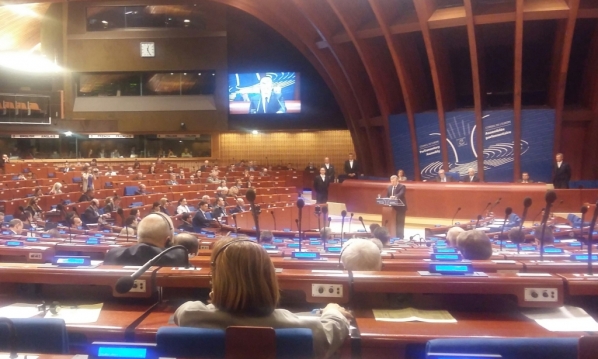With regard to a debate devoted to measures to improve women’s political representation, the Parliamentary Assembly has adopted Resolution 2111 (2016), which notes that, in spite of political commitments and legal obligations women are still vastly under-represented in politics in
most Council of Europe member States. For that reason, member states, observers and partners for democracy should consider introducing the principle of gender equality in their highest legal acts or laws governing the election process. Electoral quotas are the most effective measures to achieve significant, rapid progress, provided that they are correctly designed and consistently implemented, the PACE said. However, accompanying measures are also needed in order to achieve sustainable results, such as: allocating funds for the promotion of greater inclusion of women in politics, ensuring fair coverage of women in politics in the media and training and awareness-raising activities.
In the Resolution 2112(2016), adopted upon the proposal of Latvian MP Ms Nellija Kleinberga, the Parliamentary Assembly expressed serious concern over the numerous reports indicating the inhuman and degrading treatment of persons captured during the war in Ukraine, and invited separatist groups controlling the occupied areas of Donetsk and Luhansk to free captives and stop violating human rights. All sides included in the conflict should implement, without further delay, the Minsk Agreement, paying a special attention to exchange of prisoners, and to respect provisions of Convention relative to the Treatment of Prisoners of War and Convention for the Protection of Civilian Persons in Time of War. A special attention during the debate on this topic was devoted to case of Ms Savchenko, and the PACE called, once again, for her urgent release.
The afternoon hours of the session was focused on the topic of strengthening cooperation in fighting terrorism. The Assembly reiterated its strongest condemnation of terrorism in all forms, noting that a co-ordinated pan-European response is needed more than ever as well as cooperation with the third countries, in particular those in the European neighbourhood. The Assembly called upon the implementation of effective measures at national, international and European Union level for the purpose of preventing and combating radicalisation, integration of marginalised groups, strengthening of international cooperation in preventing acts of terrorism and fighting terrorist groups, controlling and, if appropriate, preventing the travel of individuals suspected of belonging to terrorist networks. At European Union level, the Assembly underlines the need for an ambitious European security strategy, including better exchange of information between intelligence services and a closer co-operation between police and judicial authorities.
Georgian Prime Minister Mr Giorgi Kvirikashvili addressed the Parliamentary Assembly on the penultimate day of the session. He spoke about the reforms in the electoral field, the justice system and the media, as well as his government’s efforts to make progress on the situation in the occupied territories of Abkhazia and South Ossetia.
Spring Session of the Parliamentary Assembly of the Council of Europe will be completed by debates on protection of human rights of persons with mental illnesses, key issues that the world faces in the public health field, and challenges of forced migrations.
Delegation of the Parliament of Montenegro composed of: Mr Predrag Sekulić, Head of Delegation, Ms Marija Maja Ćatović and Ms Snežana Jonica, members of Delegation, is participating in the session.








